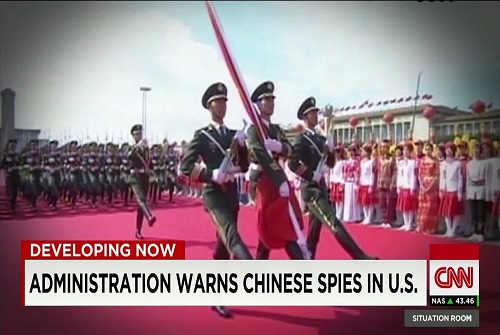U.S. considered a hotbed of Chinese espionage, says Chinese billionaire
“FBI : There are 2 types of American companies — those that have been hacked and those that don’t know it yet.” – Ty Nelson, Cyber Security, University of Maryland

China’s intelligence network has 25,000 spies now operating in the United States, with an additional 15,000 American recruits that have increased spying activities since 2012, according to reports from Guo Wengui, a billionaire investor who fled China and moved to the United States and has since become a major critic of the Chinese regime.
American counterintelligence agencies’ lack of understanding of Chinese intelligence units poses a threat to the US at large with the enormous number of American intelligence operatives busy investigating — and analyzing — American citizens, especially those considered enemies by the so-called Deep State. While the U.S. news industry appear obsessed with Russian spying on Democrats, Chinese, North Korean, and cyber mercenaries have free reign to spy on private and public sector targets.
Besides Chinese nationals working in the U.S. as intelligence agents, there are a number of cases involving American intelligence officials and military personnel who act as spies for China’s benefit. For example, last month Kevin Mallory was arrested and charged under the Espionage Act on charges of performing espionage on behalf of the Chinese government.
Mallory allegedly was given special communications devices for communicating documents to Chinese intelligence agents, including documents classified as Top Secret. The individuals alleged to be working for China’s intelligence services represented themselves as working for the Shanghai Academy of Social Sciences. Some of the material in his possession is alleged to contain sensitive information on human intelligence sources.
Prior to his arrest, Mallory had served in the United States Army and worked as a Special Agent for the Diplomatic Security Service from 1987 to 1990. Mallory worked for the Defense Intelligence Agency at some point in his career. He was a self-employed consultant for GlobalEx, LLC, who had previously worked for the Central Intelligence Agency (as a case officer between 1990 and 1996, and as a contractor between 2010 and 2012) and at the American Institute in Taiwan
During preliminary court proceedings, U.S. District Judge T. S. Ellis III ordered Mallory’s bond revoked, judging him to be a flight risk and a potential threat to national security.
The almost legendary MI5 British counterintelligence service is said to be deeply concerned over an increase in spying by Chinese operatives in the United Kingdom. Although intelligence experts aren’t certain how widespread the problem is, they believe the espionage is rampant and a serious consequence of the global economy.
MI5 suspects upwards of 15 foreign intelligence services are working within the UK and are a threat to the United Kingdom’s interests, and the primary focus of their counterespionage efforts are the Chinese and Russians.
In the United States, the FBI is suspicious of Russia, Iran, and North Korea but have focused mostly on the Chinese. The feds estimate that there are over 2,600 Chinese front companies in the U.S.
The foreign intelligence threat within the United States is far more complex than it has ever been historically. The threat is increasingly asymmetrical insofar as it comes not only from traditional foreign intelligence services but also from nontraditional, non-state actors who operate from decentralized organizations.
 Intelligence collection is no longer limited to classified national defense information but now includes targeting of the elements of national power, including national economic interests. Moreover, foreign intelligence tradecraft is increasingly sophisticated and takes full advantage of advances in communications security and the general openness of U.S. society.
Intelligence collection is no longer limited to classified national defense information but now includes targeting of the elements of national power, including national economic interests. Moreover, foreign intelligence tradecraft is increasingly sophisticated and takes full advantage of advances in communications security and the general openness of U.S. society.
In short, the foreign intelligence threat is more challenging than ever. In the fall of 2003, the Foreign Counterintelligence Program had investigations involving dozens of countries that focused on hundreds of known or suspected intelligence officers who were assigned to enter or travel within the United States. These investigations spanned all 56 field offices.
In order to meet these challenges, the Foreign Counterintelligence Program is being redesigned to become more nationally focused and directed. Through a more centralized program, the FBI will ensure its ability to establish priorities, be more proactive, and better engage other intelligence community agencies so that cooperation in important cases is immediate and seamless.
A centralized program will also ensure that infrastructure issues will be consistently addressed and coordinated in order to ensure workforce expertise, that staffing matches the articulated foreign intelligence threat, and that a sufficiently broad and reliable intelligence base is developed. From this foundation, the Foreign Counterintelligence Program will be positioned to achieve its strategic objectives and ultimately reach its goal to prevent harm to the United States through foreign intelligence activity inimical to U.S. interests.
During the past year, the Foreign Counterintelligence Program has been invigorated by the introduction of a new and innovative National Strategy for Counterintelligence and a program plan, both of which are proactive in emphasis. At the same time, additional resources were introduced to the program. To enhance counterintelligence workforce expertise, a new four-week Counterintelligence Operations course was developed.
All special agents assigned to the Counterintelligence Program are required to successfully complete this course. Computer-based distance learning courses are also available to all personnel on a variety of counterintelligence topics. A counterintelligence training course for midlevel and executive managers was also initiated, covering topics in both the tactical and strategic areas of counterintelligence management.
The FBI plays an essential role in the U.S. government’s counterintelligence efforts and has the responsibility to produce domestic foreign intelligence in support of other members of the intelligence community.
The FBI also has the responsibility to oversee the integration of domestic law enforcement and intelligence efforts to address intelligence threats in support of Director of Central Intelligence imperatives. The counterintelligence strategy involves centrally managed, proactive, and nationally directed initiatives, with prioritized and strategic objectives that support DCI imperatives, overseen by experienced headquarters managers.
Success for the Foreign Counterintelligence Program will be reflected in the extent to which the FBI agents are able to: identify the objectives, the assets, and the operations of foreign intelligence services operating in the United States; disrupt the operations of those foreign intelligence services; and change the behavior of targeted institutions and individuals to minimize opportunities for their exploitation.
Government support of critical national research and development initiatives in a large number of agencies and involving thousands of government contractors must be protected. Compromise of these initiatives by those hostile to the United States would do irreparable harm. The FBI must effectively meet its responsibility to assess the threat against those projects and, with other Intelligence Community agencies, initiate operations to counter the threat.
Critical National Assets are any information, policies, plans, technologies, or industries that, if stolen, modified, or manipulated by an adversary would seriously threaten U.S. national or economic security. The FBI has a major role in identifying threats to Critical National Assets and assessing their overall vulnerability, especially in the areas of economic espionage, academic research, and private sectorresearch and development.
As the remaining world superpower, the United States is targeted from nearly every corner of the globe. The FBI will focus its counterintelligence resources on those countries and non-state actors having the greatest potential to harm US interests, and will work to gain a greater understanding of the threats they pose. Specifically, the FBI will examine threats related to terrorism, espionage, weapons proliferation, national infrastructure, US government perception management, and foreign intelligence activities.


